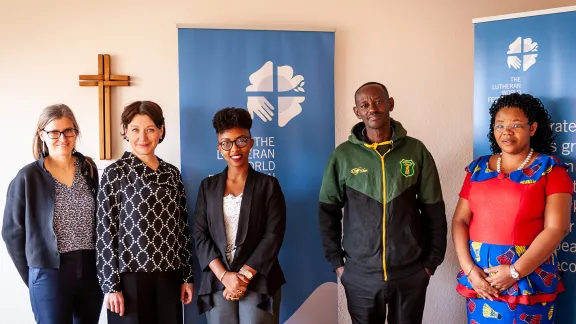The Lutheran World Federation (LWF) engages with the Universal Periodic Review (UPR) process to promote human rights in Burundi, coordinating five reports with other civil society actors, with a focus on women, girls and vulnerable groups.

A delegation from LWF Burundi met with UN member states ahead of the UPR in Geneva, Switzerland. Photo: LWF/S. Gallay
Sharing grassroot voices at the UPR
(LWI) - A delegation from the LWF country program in Burundi has participated in a review of the human rights situation in the country. As part of the Universal Periodic Review, a mechanism by the United Nations Human Rights Council to assess the human rights situation in a country, LWF submitted reports containing information on the situation for women and girls, economic, social and cultural rights, health care and the treatment of prisoners.
“Civil society organizations are often unaware, but we have a unique role in the Universal Periodic Review (UPR) process” says Merveille Mugisha, LWF Burundi Advocacy Officer. “We can improve the state of human rights in the country by offering informed recommendations to the State of Burundi through this United Nations (UN) platform.”
Highlighting the realities on the ground
On 4 May the government of Burundi took part in the peer review of their human rights situation. At the session, UN member states offered recommendations and civil society actors had an opportunity to bring grassroot voices to the table by submitting parallel reports. LWF coordinated the submission of 5 reports in collaboration with partners for this session.
Civil society organizations are often unaware, but we have a unique role in the Universal Periodic Review (UPR) process
Merveille Mugisha, LWF Burundi Advocacy Officer
“The UPR procedure helps to draw international attention to the situation in Burundi, a country that seems to be forgotten in the face of other global crises” says Ester Wolf, LWF Advocacy Officer for Human Rights.
“In order to be able to write a report in line with the realities on the ground, the LWF coordinated a training with twenty-two civil society organizations in Burundi.” says Mugisha. “The recommendations centered on women, girls and other vulnerable groups.”
Women’s rights, access to land
“This is my first time participating in this mechanism” says Gaudence Habonimana, a training participant representing a local organization. “I am delighted to have played a part in shaping recommendations that empower women. I hope that the State of Burundi will take action to prioritize women's rights especially for women prisoners."
“Rural women are the pillar of development in Burundi.” says Mugisha “They are involved in 98% of agricultural activities. Nevertheless, they have limited access to productive resources such as land. They have neither the right of ownership nor the right to decide how to use the income created by this land.”
“Burundi has been facing numerous challenges in recent years. LWF has been focusing on women and girls' rights and economic, social, and cultural rights more generally. This means access to land to produce food, to housing, to credit loans and more” says Wolf.
There are other challenges as well says Wolf, " the rights for prisoners, for example. They are in difficult situations, and women are the most vulnerable group, mainly because of stigma. Pregnant women often don't have access to sufficient healthcare or food. These are significant challenges that need to be addressed.”
Local to global
The LWF delegation shared their parallel reports with different national delegations at the human rights council, who alone have the right to formally address and report on them. Many LWF findings were taken up in the UPR session on May 4, Mugisha says:” It is encouraging to see that states we spoke with have drawn from our recommendations” says Mugisha. “A lot of countries were making recommendations on the rights of women and girls. Amongst them, several national representatives our delegation met with.”
Once the government of Burundi has decided which recommendations it will accept, LWF together with its civil society partners in the country, will support their implementation s on local and national level.
“The UPR is the global part of our local to global work. Now we can proceed to the local part once more where we can make a direct impact.”


